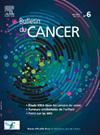Identification of immune characteristics of two lung adenocarcinoma subtypes based on immune- and pyroptosis-related genes to improve immunotherapy
IF 1.1
4区 医学
Q4 ONCOLOGY
引用次数: 0
Abstract
Background
Lung adenocarcinoma (LUAD) is the most prevalent histological subtype of lung cancer. Pyroptosis is a programmatic cell death linked to inflammation.
Methods
The data information of 541 LUAD samples and 59 normal samples were obtained from TCGA database. The analysis of differentially expressed genes (DEGs) was carried out on LUAD patients. The intersection of integrated PRGs and IRGs with DEGs yielded IPRGs. We utilized univariate Cox regression to determine IPRGs linked to overall survival (OS). Based on their expression levels, unsupervised clustering of LUAD was conducted. Patients were divided into two clusters. Analyses of immunity and drugs were performed in two clusters.
Results
One hundred and thirty-two IPRGs were linked with OS. Cluster 1 had a longer OS. Two thousand two hundred and fifty-six DEGs were detected in various subtypes. The results of immune analysis showed that most of the immune cells in cluster 2, which had a worse prognosis, had a low degree of infiltration. High Th2 cell infiltration may be related to poor prognosis in LUAD patients. Higher tumor immune dysfunction and exclusion (TIDE) and immunophenotypic scores in Cluster 1 indicated that these patients may have a better response to immunotherapy. There were significant differences in human leukocyte antigen (HLA), immune checkpoints, immunophenoscore (IPS), and TIDE scores in the two subtypes. The mutation frequencies of the top 10 genes in cluster 2 were higher than those in cluster 1. Different subtypes also had distinct sensitivities to different drugs.
Conclusion
IPRGs can be utilized for LUAD subtyping. Different subtypes have varied immune landscapes and immunotherapy responses.
基于免疫和焦热相关基因鉴定两种肺腺癌亚型的免疫特性以改进免疫治疗
背景:肺腺癌(LUAD)是肺癌最常见的组织学亚型。焦亡是一种与炎症有关的程序性细胞死亡。方法:从TCGA数据库中获取541例LUAD标本和59例正常标本的数据信息。对LUAD患者进行差异表达基因(DEGs)分析。整合的PRGs和IRGs与DEGs的交集产生了IPRGs。我们使用单变量Cox回归来确定与总生存期(OS)相关的IPRGs。基于它们的表达水平,对LUAD进行无监督聚类。患者被分为两组。免疫和药物分析分两组进行。结果:有132个IPRGs与OS相关。集群1的操作系统更长。在各种亚型中检测到2,256个deg。免疫分析结果显示,大多数预后较差的簇2免疫细胞浸润程度较低。高Th2细胞浸润可能与LUAD患者预后不良有关。第1组患者的肿瘤免疫功能障碍和排斥(TIDE)评分和免疫表型评分较高,表明这些患者可能对免疫治疗有更好的反应。两种亚型在人白细胞抗原(HLA)、免疫检查点、免疫表型评分(IPS)和TIDE评分上存在显著差异。聚类2前10位基因的突变频率高于聚类1。不同亚型对不同药物的敏感性也不同。结论:IPRGs可用于LUAD亚型分型。不同的亚型具有不同的免疫景观和免疫治疗反应。
本文章由计算机程序翻译,如有差异,请以英文原文为准。
求助全文
约1分钟内获得全文
求助全文
来源期刊

Bulletin Du Cancer
医学-肿瘤学
CiteScore
1.90
自引率
16.70%
发文量
224
审稿时长
37 days
期刊介绍:
Without doubt, the ''Bulletin du Cancer'' is the French language publication of reference in the field of cancerology. Official organ of the French Society of Cancer, this journal covers all the information available, whether in the form of original articles or review articles, but also clinical cases and letters to the editor, including various disciplines as onco-hematology, solids tumors, medical oncology, pharmacology, epidemiology, biology as well as fundamental research in cancerology. The journal proposes a clinical and therapeutic approach of high scientific standard and regular updates in knowledge are thus made possible. Articles can be submitted in French or English.
 求助内容:
求助内容: 应助结果提醒方式:
应助结果提醒方式:


